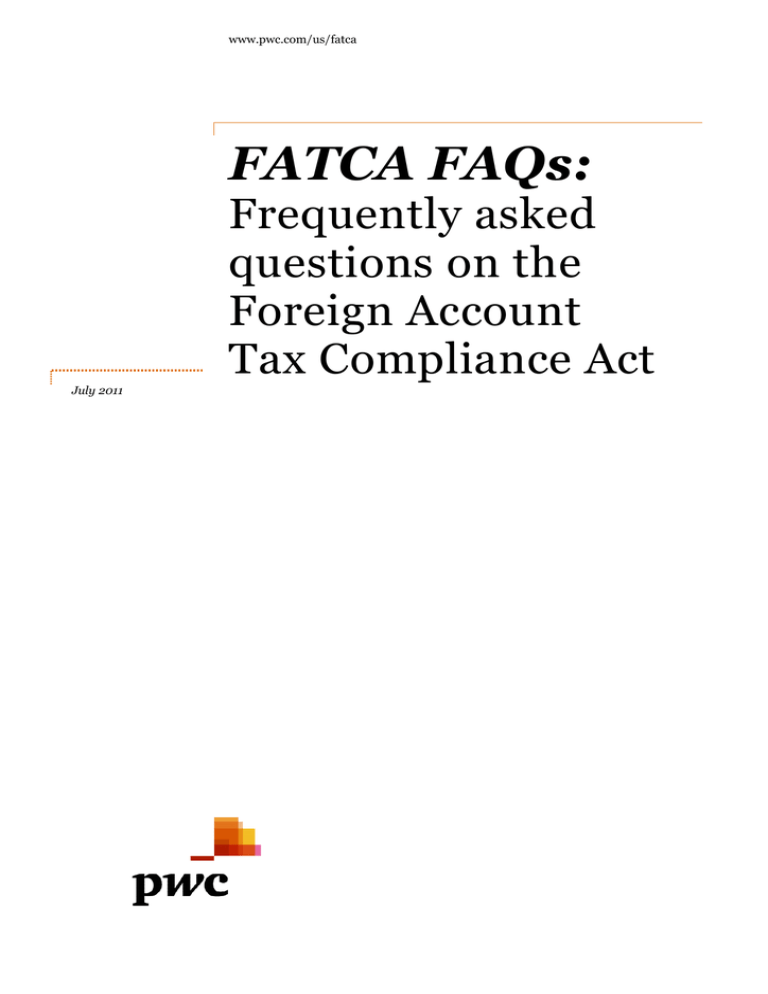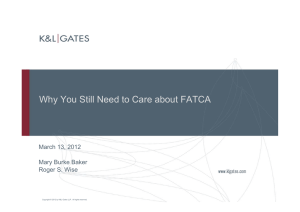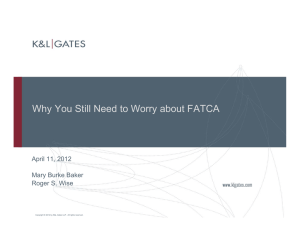
www.pwc.com/us/fatca
FATCA FAQs:
Frequently asked
questions on the
Foreign Account
Tax Compliance
Compliance Act
July 2011
1.
What is FATCA?
FATCA is an acronym for The Foreign Account Tax Compliance Act (FATCA) which was introduced in
October 2009, but ultimately enacted as part of the Hiring Incentives to Restore Employment (HIRE)
Act on March 18, 2010 (P.L. 111-147). FATCA creates a new information reporting and withholding
regime for payments made to certain foreign financial institutions and other foreign entities.
The FATCA rules have a staggered implementation timeline with the first deadline being June 30, 2013.
2.
What is the intent of FATCA?
FATCA is intended to increase transparency for the Internal Revenue Service (IRS) with respect to US
persons that may be investing and earning income through non-US institutions. While the primary goal
of FATCA is to gain information about US persons, FATCA imposes tax withholding where the
applicable documentation and reporting requirements are not met.
3.
Does FATCA replace the existing US tax withholding
and reporting regimes?
No. It does not replace the existing US tax withholding and reporting regimes. It does, however, add
additional requirements and complexity to the existing regimes. The IRS has expressed its intent to
eliminate duplicative reporting and withholding where possible.
4.
Who does this legislation impact?
FATCA is far reaching and can impact any person, US or foreign, to the extent that such person is
involved in making or receiving payments that fall within the scope of FATCA. While FATCA certainly
affects US withholding agents and US multinational companies, the greatest impact will likely be to
foreign financial institutions (FFIs).
5.
What are the withholding requirements under FATCA?
In general, a withholding agent is required to withhold 30% on a withholdable payment made to a
foreign financial institution or to a non-financial foreign entity (NFFE), unless the FFI or NFFE meets
certain requirements. In addition, an FFI must withhold 30% on any passthru payment it makes to a
recalcitrant account holder, as well as to payments it makes to another FFI unless that FFI meets
certain requirements.
6.
What is a withholding agent?
An individual, corporation, partnership, trust, association, or any other entity, including any foreign
intermediary, foreign partnership, or US branch of certain foreign banks and insurance companies that
has control, receipt, custody, disposal, or payment of any withholdable payment.
7.
What types of payments does FATCA apply to?
FATCA generally applies to two defined payment types: 1) Withholdable Payments and 2) Passthru
Payments. However, FATCA withholding is not required with respect to any payment under, or gross
proceeds from the disposition of, a grandfathered obligation.
8.
What is a withholdable payment?
In the simplest of terms, a withholdable payment is a payment of either: US source income that is fixed
or determinable, annual or periodical (FDAP) income; or gross proceeds from the sale or other
disposition (including redemption) of property that can produce US source interest or dividend income.
For example: Interest income earned on a US Treasury bond is a withholdable payment, and the gross
proceeds from the sale or other disposition of a US Treasury bond is a withholdable payment.
FATCA FAQs: Frequently Asked Questions on the Foreign Account Tax Compliance Act
Page 1
9.
What is FDAP income?
FDAP income is fixed or determinable annual or periodical gains, profits, and income, and includes
payments such as interest (including original issue discount), dividends, rents, salaries, wages,
premiums, and annuities.
10. What is a passthru payment?
The definition of a passthru payment is very broad and includes any withholdable payment and any
other payment to the extent it is attributable to a withholdable payment.
11. What is the purpose of the passthru payment concept
in FATCA?
Of the primary purposes behind the passthru payment concept is to prevent an FFI from being a
“blocker” for US persons trying to avoid US tax by making indirect investments in US assets.
12. What is a grandfathered obligation?
A grandfathered obligation is an obligation that is outstanding on March 18, 2012 (two years from the
date that FATCA was signed into law). Interest on a grandfathered obligation is exempt from FATCA
withholding, and gross proceeds from the sale or other disposition of a grandfathered obligation is also
exempt from FATCA withholding. Preliminary guidance from the IRS indicates that a grandfathered
obligation is defined as any legal agreement that produces or could produce withholdable payments,
but does not include any instrument that is treated as equity for US tax purposes, or any legal
agreement that lacks a definitive expiration or term (examples include savings, deposits, demand
deposits, and other similar accounts). In addition, a legal agreement that produces a withholdable
payment does not include broker, custodial and similar agreements to hold financial assets for the
account of others and to make and receive payments of income and other amounts with respect to such
assets. Finally, any material modification (which is determined based on the relevant facts and
circumstances) to a grandfathered obligation will cause it to lose its grandfathered status.
An example of a grandfathered obligation is a US Treasury Bond that was outstanding on March 18,
2012, and that has not been materially modified after March 18, 2012.
13. What is a recalcitrant account holder?
Generally, a recalcitrant account holder is any account holder that (1) fails to comply with reasonable
requests for information necessary to determine if the account is a United States account; (2) fails to
provide the name, address, and TIN of each “specified United States person” and each substantial
United States owner of a United States owned foreign entity; or (3) fails to provide a waiver of any
foreign law that would prevent a foreign financial institution from reporting information required
under FATCA.
14. What is a US person?
The term ‘‘United States person’’ means:
A citizen or resident of the United States
A domestic partnership
A domestic corporation
Any estate other than a foreign estate
Any trust if:
A court within the United States is able to exercise primary supervision over the administration
of the trust, and
One or more United States persons have the authority to control all substantial decisions of the
trust
Any other person that is not a foreign person.
FATCA FAQs: Frequently Asked Questions on the Foreign Account Tax Compliance Act
Page 2
15. What is a specified US Person?
A specified US person is any US person except for
A corporation whose stock is regularly traded on an established securities market (and any
corporation which is a member of the same expanded affiliated group as a corporation whose stock
is regularly traded on an established securities market);
An entity that is tax exempt under U.S federal income tax under IRC Section 501(a);
An Individual Retirement Plan;
The US or any wholly owned agency or instrumentality of the US;
A state, the District of Columbia, a possession of the US, any political subdivision or wholly owned
agency or instrumentality of a state, the District of Columbia or a possession of the US;
Banks, real estate investment trusts (REITs) or regulated investment companies (RICs);
A common trust fund (as defined in IRC Section 584(a)); and
A trust that is exempt from federal tax under IRC Section 664(c), or that is defined in IRC Section
4947(a)(1).
16. How is an FFI defined under FATCA?
The definition of an FFI is very broad and is expected to encompass a number of entities generally not
considered to be financial institutions. An FFI is any foreign entity that:
Accepts deposits in the ordinary course of a banking or similar business;
As a substantial portion of its business holds financial assets for the account of others; or
Is engaged (or holding itself out as being engaged) primarily in the business of investing,
reinvesting, or trading in securities, partnership interests, commodities, or any interest (including a
futures or forward contract or option) in such securities, partnership interests, or commodities.
Accordingly, the term financial institution may include among other entities, investment vehicles such
as hedge funds and private equity funds.
17. Are any foreign financial institutions exempt from
FATCA withholding on their income?
Yes. Certain foreign financial institutions are exempt from FATCA withholding. The Statute provides
that a withholding agent does not need to perform FATCA withholding on payments where the
beneficial owner is:
Any foreign government, any political subdivision of a foreign government, or any wholly owned
agency or instrumentality of any one or more of the foregoing;
Any international organization or any wholly owned agency or instrumentality thereof;
Any foreign central bank of issue; or
Any other class of persons identified by the Secretary for purposes of this subsection as posing a
low risk of tax evasion.
FATCA FAQs: Frequently Asked Questions on the Foreign Account Tax Compliance Act
Page 3
18.
Other than the exemptions in the Statute, are any
other foreign entities expected to be excluded from
being FFIs?
Yes. Preliminary guidance from the IRS and US Treasury indicates the following entities will not be
FFIs, and will instead be treated as NFFEs. Treasury and IRS intend to exempt payments beneficially
owned by these entities from FATCA withholding, but these rules have not yet been provided:
Certain holding companies – limited to entities whose primary purpose is to act as a holding
company for a subsidiary or group of subsidiaries that primarily engage in a trade or business other
than that of a “financial institution.”
Start-up companies – applies to certain entities that invest capital into assets with the intent to
operate a non-financial institution business, but is not yet operating such a business. This exclusion
only applies to the first 24 months after the entity’s organization. After such time, a foreign entity
will no longer qualify for this particular exclusion.
Liquidation or Bankruptcy – Non-financial entities that are liquidating or emerging from
reorganization or bankruptcy. This exception only applies if such an entity was not a financial
institution before beginning the liquidation or reorganization process.
Hedging/financing centers of a non-financial group – an entity that primarily engages in financing
and hedging transactions with or for members of its expanded affiliated group that are not FFIs
and that does not provide such services to non-affiliates, may only be excluded from the definition
of a financial institution if the expanded affiliated group is primarily engaged in a non-financial
institution business.
Certain insurance companies – entities whose business consists solely of issuing insurance or
reinsurance contracts without a cash value.
19. What is a financial account?
With respect to a financial institution, a financial account is:
Any depository account maintained by the financial institution;
Any custodial account maintained by the financial institution; and
Any equity or debt interest in such financial institution (other than interests that are readily
tradable on an established securities market).
20. What is a participating FFI?
An FFI that enters into a FFI agreement with the IRS is referred to as a “participating foreign financial
institution” (PFFI). An FFI that does not enter into an agreement with the IRS is referred to as a “nonparticipating foreign financial institution” (NPFFI), and is subject to withholding under FATCA.
FATCA FAQs: Frequently Asked Questions on the Foreign Account Tax Compliance Act
Page 4
21. What does an FFI Agreement require an FFI to do?
An FFI Agreement is an agreement between the IRS and a participating FFI. Although the IRS has not
yet made a version of the agreement available, it is expected that the provisions of the agreement will
require an FFI to perform the following functions:
Obtain information on account holders that is necessary to determine if accounts are US accounts;
Comply with any required due diligence/verification procedures;
Report information on US accounts;
Deduct and withhold a 30% tax on “passthru payments” paid to account holders who do not supply
the required information (“recalcitrant account holders”), or paid to another FFI that does not meet
the requirements of Section 1471 (e.g., does not enter into an FFI agreement);
Comply with IRS information requests; and
Attempt to obtain from US accounts a waiver of applicable bank secrecy or other information
disclosure limitations, and close the US accounts if a waiver is not obtained within a reasonable
period of time.
22. What is an FFI EIN?
In supplemental guidance, the IRS noted that each participating and deemed compliant FFI will be
issued an employer identification number (FFI EIN) which will be used to identify the entity. Until the
IRS begins issuing FFI EINs, withholding agents and participating FFIs will be able to rely on
certifications provided by FFIs as to their status unless the withholding agent or participating FFI
knows or has reason to know a certification is incorrect. At this time, the specifics for certification and
issuance of FFI EINs are not clear.
23. What is a deemed compliant FFI?
Certain FFIs will not be required to enter into an FFI Agreement with IRS in order to be exempt from
FATCA withholding. These FFIs are referred to as deemed-compliant FFIs. These FFIs will be required
to: (a) apply for deemed-compliant status with the IRS; (b) obtain an FFI EIN from the IRS; and (c)
certify to the IRS every three years that it meets the requirements for deemed-compliant status.
Deemed-compliant status is reserved for a class of entities that Treasury has deemed to pose a low risk
of tax evasion, such as certain local banks, local FFI members of participating FFI groups, and certain
investment vehicles.
24. What is the definition of an NFFE under FATCA?
An NFFE is a foreign entity that is not a financial institution.
25. Are all NFFEs subject to FATCA withholding?
FATCA withholding is not required on a payment to a NFFE if the payment is beneficially owned by:
Any corporation whose stock is regularly traded on an established securities market;
Any corporation that is a member of the same expanded affiliated group as a corporation whose
stock is regularly traded on an established securities market;;
Any entity organized under the laws of a US possession and wholly owned by one or more bona fide
residents of the possession;
Any foreign government, any political subdivision of a foreign government, or any wholly owned
agency or instrumentality of one or more of them;
Any international organization or wholly owned agency or instrumentality of an international
organization;
Any foreign central bank of issue; and
Any other class of persons identified by the Secretary as posing a low risk of tax evasion.
FATCA FAQs: Frequently Asked Questions on the Foreign Account Tax Compliance Act
Page 5
26. What is a substantial US owner?
A substantial US owner generally refers to a US owner that has a 10% or greater interest in an NFFE.
However, where the entity is an investment vehicle (e.g., a hedge fund), any US owner is considered a
substantial US owner.
27. If an FFI does not hold any US investments, must it
still enter into an FFI Agreement with the IRS in order
to avoid FATCA withholding?
Yes. A non-participating FFI that does not hold any direct US investments may still be subject to
FATCA withholding if it receives passthru payments.
28. Are US branches of foreign entities excepted from the
definition of an FFI?
No. While there is no such exemption, income that is effectively connected with a US trade or business
is excluded from the definition of a withholdable payment. However, the exclusion does not apply to all
payments made to an FFI’s US branch (e.g., the exclusion does not apply to withholdable payments that
a US branch of an FFI receives on behalf of its account holders, rather than for its own account).
29. Will controlled foreign corporations (CFCs) that are
FFIs be treated as deemed compliant FFIs under
FATCA?
No. The guidance requires CFCs (generally a non US corporation in which more than 50 percent of the
total combined voting power of all classes of stock entitled to vote is owned directly, indirectly, or
constructively by US shareholders) that meet the definition of an FFI to become PFFIs by entering into
an FFI agreement with the IRS. This is the case despite the fact that CFCs already have certain US tax
withholding and reporting requirements as US payers.
30. What information must an FFI report to the IRS
regarding US accounts?
Unless it elects to report as if it is a US person, a participating FFI must report the following with
respect to all US accounts maintained:
The name, address and US tax identification number (TIN) of each account holder that is a
specified US person;
In the case of any account holder that is a US entity with one or more US owners, the name,
address and TIN of each substantial US owner of such entity;
The account number;
The year-end account balance or value; and
Gross receipts and gross withdrawals or payments from the account.
FATCA FAQs: Frequently Asked Questions on the Foreign Account Tax Compliance Act
Page 6
31. What are “gross receipts and gross withdrawals or
payments” in the case of depository accounts and
custody accounts?
With respect to depository accounts and custody accounts, gross receipts and gross withdrawals means:
The gross amount of dividends paid or credited to the account;
The gross amount of interest paid or credited to the account;
Other income paid or credited to the account; and
Gross proceeds from the sale or redemption of property paid or credited to the account with respect
to which the FFI acted as a custodian, broker, nominee, or otherwise as an agent for the account
holder.
32. What are “gross receipts and gross withdrawals or
payments” in the case of accounts that are not
depository accounts and custody accounts?
With respect to accounts that are not depository accounts or custody accounts, gross receipts and gross
withdrawals or payments means the gross amount of all distributions, interest, and similar amounts
credited during the year and each redemption payment made during the year.
33. In addition to information regarding US accounts, is
there other information that a participating FFI must
report to the IRS?
An FFI also needs to report to the IRS annually:
The number and aggregate value of financial accounts held by recalcitrant account holders;
The number and aggregate value of financial accounts held by related or unrelated NPFFIs; and
The number and aggregate value of financial accounts held by recalcitrant account holders that
have US indicia.
34. What are the consequences of having an account that
has “indicia” of US status?
If an account has indicia of US status, the FFI must obtain documentation to establish the status (US or
non-US) of the account holder. If documentation is not obtained to establish that the account is not a
US account, the FFI will be required to report the account to the IRS as either a US account or a
recalcitrant account holder and may have to withhold tax on certain payments to the account.
FATCA FAQs: Frequently Asked Questions on the Foreign Account Tax Compliance Act
Page 7
35. What are indicia of US status for accounts owned by
individuals?
Generally, the following information is indicia of US status for an account owned by an individual:
US citizenship or a lawful permanent US resident;
US place of birth;
Residence address or correspondence address in the US (including a US post office box);
Standing instructions to transfer funds to an account maintained in the US or directions regularly
received from a US address;
An “in care of” or “hold mail” address that is the sole address with respect to the client; and
Power of attorney or signature authority granted to a person with a US address.
36. How will the IRS ensure that participating FFIs
complete the customer identification procedures for
pre-existing individual accounts?
Although the entire process of auditing and validating that the FFI is in compliance is still unknown,
the IRS has provided that a FFI’s chief compliance officer or other equivalent-level officer (responsible
officer) will be required to certify when certain due diligence and written policies and procedures are in
place. Treasury and the IRS intend to provide future guidance on the timing and specifics of these
certifications.
37. With respect to an FFI, what is an expanded affiliated
group?
Withholding, reporting, and other requirements imposed upon an FFI under FATCA will also apply to
each other FFI which is a member of the same expanded affiliated group (FFI Group) that includes the
FFI. For these purposes, the expanded affiliated group is determined in rules similar to the affiliated
group rules under IRC Section 1504(a), except 50 percent replaces 80 percent’ each place it appears
and includes insurance companies and foreign corporations.
38. Does FATCA apply to FFI affiliates in an FFI group?
Treasury has indicated that regulations will require that each FFI affiliate in an FFI Group must be a
PFFI or a deemed compliant FFI. Each FFI affiliate in the FFI Group that will become a PFFI must
execute an FFI Agreement with the IRS, and each PFFI will be responsible for its own due diligence,
withholding, reporting, and return filing requirements under its FFI Agreement. In addition, each FFI
affiliate will be issued its own FFI-EIN.
39. What is an NFFE required to do in order to avoid
FATCA withholding?
In general, in order to avoid 30% FATCA withholding, an NFFE (other than an excepted NFFE) must
provide the withholding agent with either:
A certification that the NFFE does not have any substantial US owners (i.e., owners with a more
than 10% interest); or
The name, address, and US Taxpayer Identification Number (TIN) of each substantial US owner.
Where the NFFE provides information in regard to substantial US owners, the withholding agent must
report that information to the IRS.
FATCA FAQs: Frequently Asked Questions on the Foreign Account Tax Compliance Act
Page 8
40. How will third party insurance or investment
products be treated for FATCA?
Treasury and the IRS do not view the issuance of insurance or reinsurance contracts without cash value
as a concern. These would include, for example, most property and casualty insurance or reinsurance
contracts or term life insurance contracts. Accordingly, Treasury and the IRS plan to issue regulations
treating entities whose business consists solely of issuing such contracts as NFFEs.
However, other contracts such as life insurance (other than term life insurance contracts without cash
value) or annuity contracts typically combine insurance protection with an investment component.
Thus, such cash value insurance contracts or annuity contracts may present the risk of US tax evasion
that FATCA is designed to prevent. Treasury and the IRS are considering the appropriate treatment of
entities that issue cash value insurance contracts, annuity contracts, or similar arrangements.
41. Is a pension fund an FFI under FATCA?
Yes. A pension fund is a financial institution under FATCA. However, it is anticipated that pension
funds may qualify for an exemption from FATCA as entities that pose a low risk of tax evasion.
It is anticipated that a pension fund becomes exempt if it meets the following criteria:
Qualifies as a retirement plan under the laws of the country in which it is established;
Is sponsored by a non-US employer; and
Does not allow US participants or beneficiaries other than employees who worked for the non-US
employer in the country in which the retirement plan is established during the period during in
which benefits accrued.
42. How will FATCA affect Qualified Intermediaries (QI),
Foreign Withholding Partnerships (FWP), and
Foreign Withholding Trusts (FWT)?
Treasury and the IRS have indicated that they intend to amend QI, FWP and FWT agreements to
require these FFIs to become participating or deemed-compliant FFIs. Further, entities that apply to
become a QI, an FWP, or an FWT after the effective date of FATCA will be required to become
participating or deemed-compliant FFIs.
43. When will final rules be issued?
That is not clear at this point. While the FATCA legislation was issued on March 18, 2010, the
legislation itself was in some respects merely directional guidance for Treasury to develop the FATCA
rules via regulations. To date, no regulations have been issued. However, there has been guidance
issued by Treasury in the form of three notices –
Notice 2010-60 which is generally referred to as preliminary guidance; and
Notices 2011-34 and 2011-53 which are generally referred to as supplemental guidance.
These notices do not address all of the open issues, and in some cases, raise additional questions.
Additional guidance (either in the form of additional notices or regulations) will be coming. In addition,
Treasury has indicated that it will issue a sample FFI Agreement. However, Treasury has stated they
anticipate issuing the Proposed regulations by 31 December 2011. After consideration of comments,
Treasury and IRS anticipate publishing final regulations in the (U.S.) summer of 2012. Treasury
continues to reach out to potential stakeholders seeking additional comments.
FATCA FAQs: Frequently Asked Questions on the Foreign Account Tax Compliance Act
Page 9
44. Is there any chance that FATCA will be repealed or get
postponed?
It is not likely that FATCA will be repealed. Further, in Notice 2011-53 IRS and Treasury have
postponed implementation of FATCA such that FFIs do not need to enter into agreements with the IRS
until June 30, 2013 and withholding is not required until January 1, 2014.
FATCA FAQs: Frequently Asked Questions on the Foreign Account Tax Compliance Act
Page 10
For more information, please contact:
Tax
Assurance – Forensics
David Snowden
t: (02) 8266 7927
e: david.snowden@au.pwc.com
Malcolm Shackell
t: (02) 8266 2993
e: malcolm.shackell@au.pwc.com
Michael Muncaster
t: (03) 8603 4548
e: michael.muncaster@au.pwc.com
Kylie Rixon
t: (03) 8603 2763
e: kylie.rixon@au.pwc.com
Liam Collins
t: (03) 8603 3119
e: liam.collins@au.pwc.com
Nicole Salimbeni
t: (02) 8266 4002
e: nicole.salimbeni@au.pwc.com
John Shipman
t: (02) 8266 0198
e: john.shipman@au.pwc.com
Elizabeth Goodbody
t: (02) 8266 0271
e: elizabeth.goodbody@au.pwc.com
Michelle Fitzgerald
t: (03) 8603 2997
michelle.fitzgerald@au.pwc.com
© 2011 PricewaterhouseCoopers. All rights reserved. In this document, “PwC” refers to PricewaterhouseCoopers a partnership formed in
Australia, which is a member firm of PricewaterhouseCoopers International Limited, each member firm of which is a separate legal entity.





